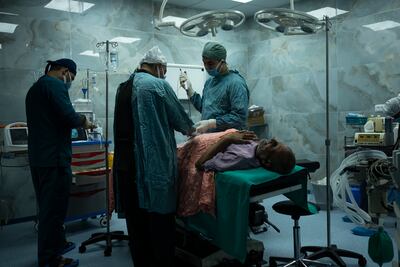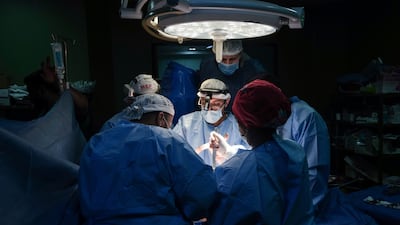Live updates: Follow the latest on Israel-Gaza
Doctors and nurses in Gaza say they are struggling under the strain of Israel's relentless bombardment of the war-torn enclave, where more than 500 healthcare workers have been killed since October.
Health centres face a lack of humanitarian supplies and specialised staff as the war rages through its 10th month, with doctors accusing Israeli forces of launching attacks on medical personnel.
At least 274 aid workers and hundreds of healthcare workers, including 138 nurses, have been killed since the conflict began in early October, health authorities in Gaza have said.
Doctors told The National they feared for the future as they struggle to save lives and survive in Gaza.

“This is the largest number of medics killed, this war is different, it has highly impacted the morale of those working in the health sector, due to the direct targeting of medical teams,” Dr Mahmoud Hamad, director general of administrative affairs at the Gaza Health Ministry, told The National.
Those killed were highly qualified professionals who cannot be replaced, he added. “Medical teams now fear for their lives as they provide services, which naturally affects their work.”
Some doctors have stopped working or have chosen to leave Gaza owing to safety fears. More than 38,800 people have been killed in Gaza since the war began in October, when about 1,200 people were killed in the Hamas-led attack on southern Israel.
Despite the pressures doctors face in the enclave and the threats posed by Israeli strikes, medics are “still fulfilling their humanitarian duties", Dr Hamad said.
Dr Ahmed Al Moghrabi was head of the plastic surgery and burns department at Nasser Medical Complex in the southern city of Khan Younis, but he left Gaza in April after the hospital was besieged by the Israeli military. He is now in Egypt with his wife and six children.
"I witnessed how the medical crew was deliberately targeted in an immoral way. I also lost several colleagues who were killed along with their families, and others were arrested, with no information about their whereabouts," he told The National.
He has no plans to return to Gaza, despite facing challenges trying to build a new life for his family. He said Israeli troops "are deliberately targeting medical crews, arresting and killing them. There is no protection for doctors, which is very depressing for us and affects the quality of our work".
'Heroes'
The UN agency for Palestinian refugees receives 1,000 patients a day across its eight clinics in Gaza, spokeswoman Tamara Rifai told The National. She described doctors working in the enclave as "heroes."
“We are going to run out within a few weeks if we do not manage to get more supplies," Ms Al Rifai said.
She added that the agency faced two major challenges. "One is the very, very low access of humanitarian drugs, including those that carry medical supplies, but also our inability to truly go around the entire Gaza Strip," she said. "We're still getting our access permits denied to the north.”
At least 90 people were killed and about 300 injured last week in an Israeli attack on Al Mawasi, in southern Gaza. The army said Mohammed Deif, the head of Hamas's military wing, was the target of the attack.
“The repeated mass casualty events resulting from the unrelenting hostilities have stretched to breaking point the response capacity of our hospital – and all health facilities in southern Gaza – to care for those with life-threatening injuries,” said William Schomburg, head of the Gaza sub-delegation for the International Committee of the Red Cross.
“Another mass casualty event would force our doctors and nurses to make extremely difficult choice. The current medical needs of civilians dramatically outstrip the limited availability of supplies and healthcare response, as hospitals have repeatedly been compelled to close."

